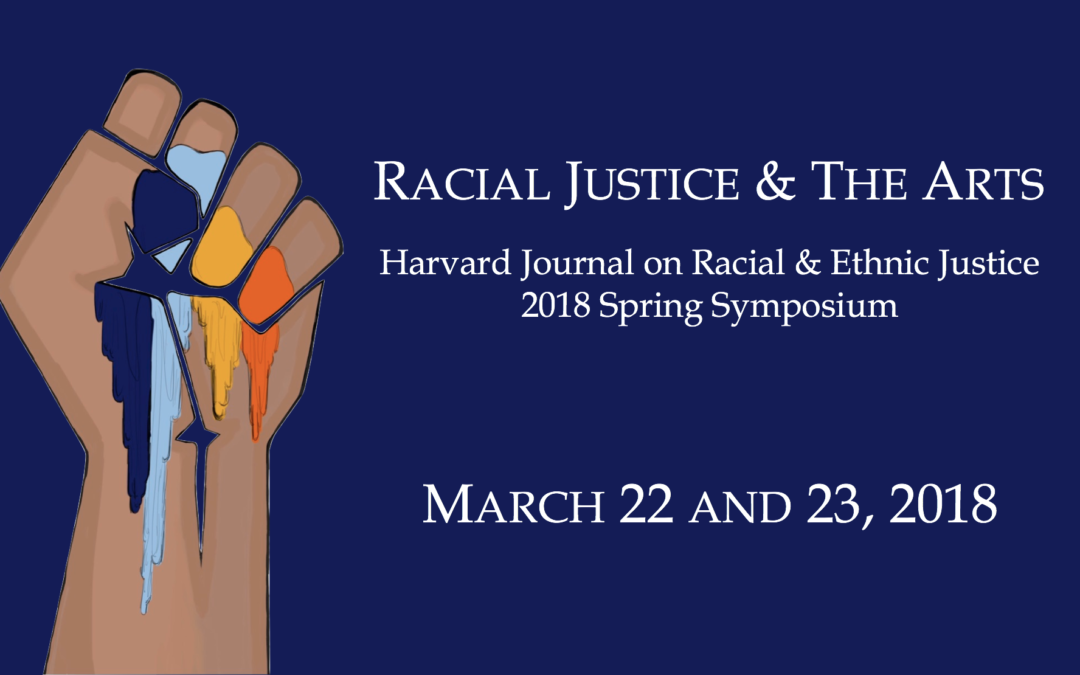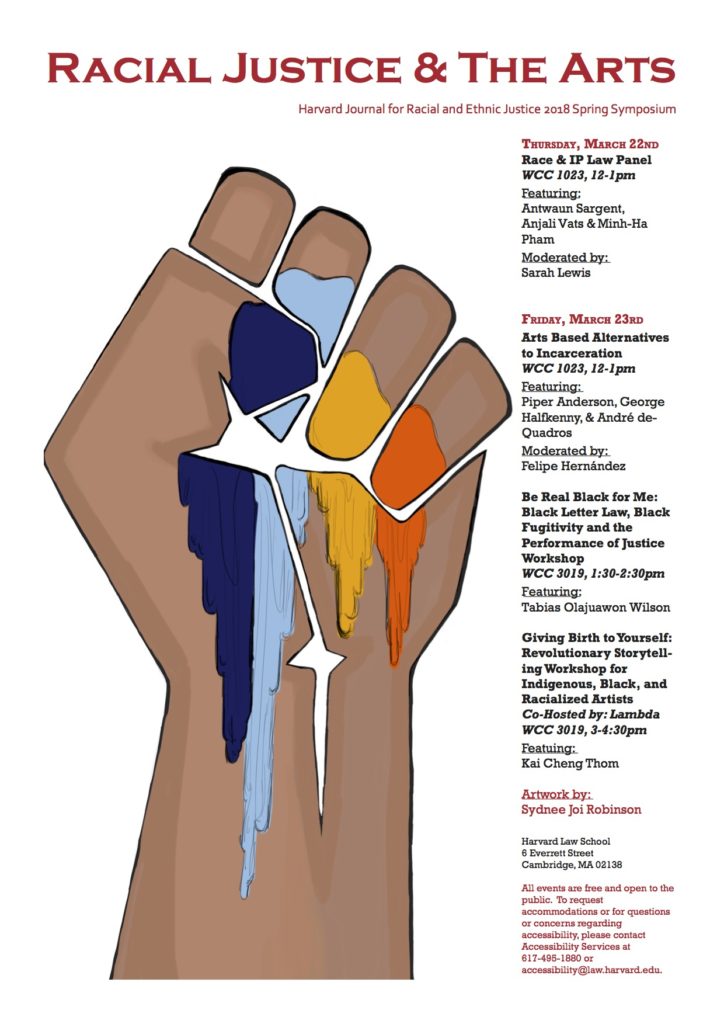RACIAL JUSTICE & THE ARTS
Harvard Law Journal on Racial and Ethnic Justice Spring Symposium
March 22-23, 2018, at Harvard Law School
1585 Massachusetts Ave, Cambridge, MA 02138
Free and open to the public. For general questions, please contact arawlings@jd19.law.harvard.edu. To request accommodations or for questions or concerns regarding accessibility, please contact Accessibility Services at 617-495-1880 or accessibility@law.harvard.edu.
Thursday, March 22, 2018
Race & Intellectual Property Law
Wasserstein Hall, Room 1023, 12:00 to 1:30pm
Featuring Antwaun Sargent, Anjali Vats, and Minh-Ha Pham. Moderated by Sarah Lewis.
The kick-off event for the Journal on Racial and Ethnic Justice’s Spring Symposium will explore questions about the construction of racial identity based on access to and control of production of knowledge (in the form of art, pop culture, and mass media). How does intellectual property law facilitate cultural appropriation? How does it ascribe value to racialized representations for public consumption? How can it be leveraged to bring the means of (art) production to people of color? How do our collective understandings of art and race determine the creation and interpretation of intellectual property law? This panel will seek to address these questions and much more.
Minh-Ha Pham and Antwaun Sargent will be unable to attend due to the snowstorm and transportation cancellations. The event will still be going forward with Anjali Vats and Sarah Lewis and promises to be a lively conversation nonetheless.
Panelists include Antwaun Sargent (@sirsargent), a freelance writer and contemporary art critic who is published on Vice, Vogue.com, Huffington Post, and many other platforms. Sargent hails from Chicago, and his unique aesthetic combines the written word with fashion statements, incorporating issues of social injustice with visual art in a delicate balance of creativity and criticism.
Anjali Vats is Assistant Professor of Communication and African and African Diaspora Studies at Boston College and Assistant Professor of Law, by courtesy, at Boston College Law School. Professor Vats is currently working on a monograph entitled Created Differences: Intellectual Properties, Racial Formation, and the Making of Americans which considers the relationships between race, citizenship and intellectual properties. She has published articles in the Quarterly Journal of Speech, Communication and Critical/Cultural Studies, and Southern Communication Journal. In 2016, Professor Vats was awarded an AAUW Postdoctoral Fellowship and an Exemplary Diversity Scholar Citation from the National Center for Institutional Diversity at the University of Michigan. Prior to teaching, she clerked for the Honorable A. William Maupin of the Supreme Court of Nevada.
Minh-Ha T. Pham is an interdisciplinary scholar and Associate Professor at the Pratt Institute whose research examines how relations of race, gender, and capitalism shape and are reshaped by social media practices and platforms. Currently, she is working on two book projects: (1) a book, tentatively titled Social Legality: Mediating Race, Morality, and Piracy, that investigates how social media is an extra-legal but no less authoritative site for the production and maintenance of race and property relations in the context of fashion design, a work that is not protected under U.S. copyright law (2) a co-edited collection of essays (with Anjali Vats and Deidre A. Keller) that intends to expand the interdisciplinary scope and reach of the subfield of race and intellectual property beyond the legal academy.
The conversation will be moderated by Sarah Lewis, a bestselling author, curator, and an Assistant Professor at Harvard University. Her essays on race, contemporary art and culture have been published in many journals as well as The New York Times, The New Yorker, Artforum, Art in America and for the Smithsonian, The Museum of Modern Art, and Rizzoli.
Friday, March 23, 2018
Arts Based Alternatives to Incarceration
Wasserstein Hall, Room 1023, 12:00 to 1:00pm
Featuring Piper Anderson, Goerge Halfkenny, and André de Quadros. Moderated by Felipe Hernandez.
The problems of mass incarceration and racially disproportionate rates of incarceration have led many to consider more transformative and restorative means of redress for harm and trauma. This panel will explore current arts-based practices of people engaged in this mission. How do art based methods help rehabilitate individuals involved with our criminal legal carceral system? How can art help us to understand the role of race in criminal punishment? What do different music traditions teach us about what justice looks like? How can storytelling be used as an instrument for institutional change, particularly for people of color?
Piper Anderson is a writer, educator, and cultural organizer who has spent more than 17 years leveraging the tools of art-making and community engagement to create social impact. Her work has taken her to over U.S cities, Mexico, and Rwanda delivering creative responses to racial and gender injustice. In 2015, she founded Create Forward LLC, which delivers creative strategies for social change that activate the collective imagination. In spring 2016, Anderson was awarded a TED Residency to develop an innovative art-and-design project called Mass Story Lab. By 2018, Mass Story Lab will travel to more than 20 communities grappling with the impact of mass incarceration.
George Halfkenny is a survivor of the school to prison pipeline. Halfkenny uses both his training and personal experiences to educate youth and their communities about restorative justice, the antecedents to the school to prison pipeline, and mass incarceration. He has performed with And Still We Rise, a theater company comprised of actors who have been impacted by the criminal punishment system, weaving personal stories into heartfelt performances and exploring the lines between theater and reality.
André de Quadros is a Professor of Music at Boston University. He is a conductor, ethnomusicologist, music educator, writer, and human rights activist who has conducted and undertaken research in over forty countries around the globe. A staunch advocate for the democratization of music, André de Quadros teaches in two Massachusetts prisons. An ardent human rights and social change activist, André de Quadros believes that consensus music-making can bring people and cultures together. To that end, he has been at the forefront of efforts for music and social change.
The conversation will be moderated by Felipe Hernandez (HLS ’20).
Be Real Black for Me: Black Letter Law, Black Fugitivity and the Performance of Justice Workshop
Wasserstein Hall, Room 3019, 1:30 to 2:30pm
Featuring Tabias Olajuawon-Wilson.
This multi-medium workshop, performance and presentation—including poetry, creative prose, legal theory and arguments/practices of fugitive lawyering/planning—seeks to chart a path forward in the understanding of how law operates as the public logic of power and how Black interdisciplinary scholars and practitioners of law might engage in re-readings of legal texts, histories and aftermaths in this crucial moment. This rendering argues that Black Americans have been—and remain—fugitives by law and the embracement of this fugitive criminality opens pathways to autonomies and languages of freedom. As fugitives from justice, we are understood as the legal property, debtor and irritant of state; enduring what Hartman has called the “afterlives of slavery.” The blood and conception of the Black Fugitive provides the bounds and ink of jurisprudence; first defining constitutional “freedom” through the Fugitive Slave Law of 1793 and the Fugitive Slave Act of 1850, swimming through the criminality exceptions of the 13th amendment, and continuing with mass deportations and ongoing acquittals of vigilante police, citing constitutional protections. To the settled body the world of the fugitive—the life of flight—is at once unimaginable and the province of fantasy. It cannot be mapped because there is no fixed location, no temporal landing place. It is a place, a practice, an epistemology that is best understood in terms of escape; as escape is the lodestar of the fugitive. But what is the fugitive? How does one become fugitive? Is it of their own making or imputed; a politic, predicament or perhaps some blend? What of fugitive law? And what of a life of flight? Is it possible to imagine life, law and flight together; as projects, predicaments and/or politics of the same community? This rendering poses and attempts to answer these questions in languages and mediums most familiar to the Black experience and linked to conceptions of freedom.
Giving Birth to Yourself: Revolutionary Storytelling Workshop for Indigenous, Black, and Racialized Artists
Wasserstein Hall, Room 3019, 3:00 to 4:30pm
Featuring Kai Cheng Thom.
As racialized, Indigenous, and mixed-race folk, we very often come into the world with a story of what we are not: white, whole, beautiful, enough. This story is the soul of colonization: it drains us of the will to struggle, of the confidence to name ourselves and our ancestors, the vision to see each other and act in solidarity. The colonizer’s story is thus an anti-story, an unstory; it erases and diminishes our bodies and rips away our languages. The colonizer’s story surrounds and suffocates us, blocking out life and light. But the most powerful stories are born in the dark. The potential of stories as both revolutionary and therapeutic will be explored, as will the possibilities and limitations of writing/storytelling in indigenous versus colonial languages. Participants will experiment with the use of story tools, including meditation, visualization, play, story-listening, and group creation. Poets, writers, rappers, spoken word artists, slam poets, storytellers of all kinds and at all stages welcome!


